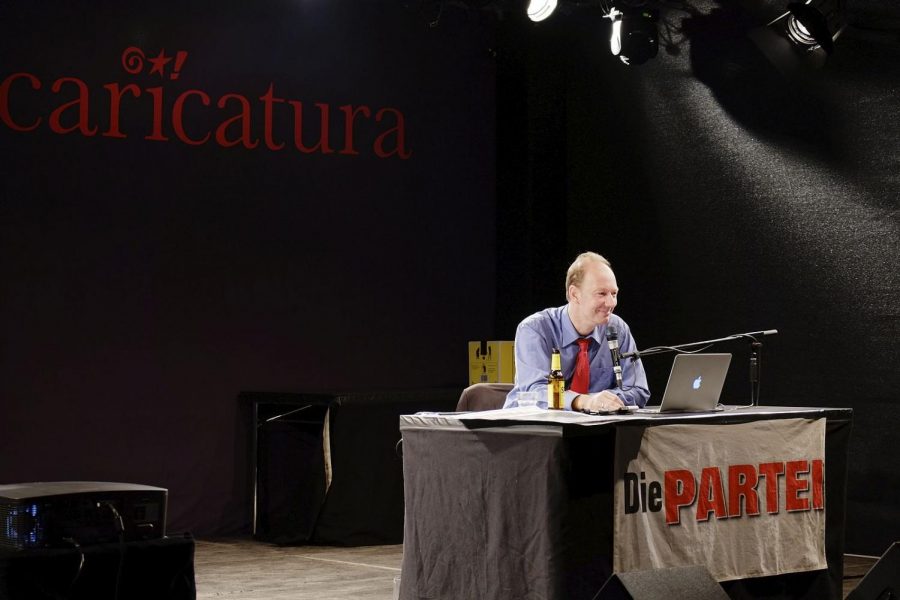Die PARTEI – How satire found its way into European politics
This photo can be found at: https://www.flickr.com/photos/martinkrolikowski/9580069510/in/photolist-V4hCUb-DpRXEY-fAymUf-ad6LS1-9n5SDr-9n5SAg-cavnZy-8wfLAv-9EeY8t-7afFNU-7afFUd-7abSBP-Hk33ZC-UQa74X-oW2dYb-rSCGSb-oW2mLp-pdtEyq-aFwy66-pdeNfK-oW1GMw-pdeKAg-XSJPjv-oW1iLF-YvnvUF-cbsJyu-4Xtph-aFwxtc-XgKgbq-XgKg3E-XEuVnt-XEv28r-XgK5cG-XBL4is-4Xtjh-XSJX1c-XgKbiQ-XBL5i3-XBL4So-XBL5dy-ryqFP6-XgKapW-XBL4cL-XEuDJK-oW2gUw-XgKjsf-XBL5m9-XgKims-rAarXs-XEuDvi
January 21, 2020
Since 2019, two members of European Parliament (MEP) belong to “Die PARTEI,” a German political party founded in 2004 by the editors of the German satirical magazine Titanic. Some of the party’s proposals have included building a wall around Switzerland and offering virtual reality vacation trips for the elderly. The name of the party, ‘Die PARTEI,’ is an backronym of the German words for “Party for Labour, Rule of Law, Animal Protection, Promotion of Elites and Grassroots Democratic Initiative,” forming the German word for ‘party’ – ‘Partei.’
Although taking part in several federal elections since its founding, Die PARTEI has never gained a seat in the German Parliament. However, the party has had successes in the European Parliament (EP). In 2014 it received over 180 thousand votes, representing 0.6% of the total votes cast. This result meant that Die PARTEI was able to send one representative to the EP. In 2019, Die PARTEI quadrupled its results, ending up with 2.4% of the German popular vote. Subsequently, the party gained two seats in the EP.
How does a party like Die PARTEI garner such a significant number of votes?
The answer has three main components. First, and most importantly, there is no percentage threshold that a party needs to overcome in European elections, which means that all of Germany’s 96 seats in European Parliament are distributed proportionately to the amount of votes a party receives. In contrast, in German federal elections parties need to clear a five percent threshold, requiring them to get at least five percent of the popular vote in order to gain any seats in the Bundestag. This obstacle disincentivizes voters to opt for smaller parties, as it is unclear whether they will be able to overcome the hurdle and whether the vote will ultimately be “lost.” Since there is no such threshold in European elections, it is easier for smaller parties to gain seats, which has been the case with Die PARTEI.
Secondly, by electing Die PARTEI, voters show their discontent with the political landscape by empowering a party that is based on satire and comedy. This ridicules the current political landscape and might prompt other politicians to consider the reasons for Die PARTEI’s recent success.
Lastly, Die PARTEI’s presence on social and popular media is a crucial factor in contributing to its gains in the last election. It has amassed 167 thousand followers on Twitter. In comparison, one of Germany’s governing parties, the CDU, which is also the party of German chancellor Angela Merkel, has around 300 thousand followers. For such a young and seemingly insignificant party as Die PARTEI, this amount of Twitter followers is immense and gives it a platform to mobilize voters. Furthermore, one of Die PARTEI’s two MEPs, Nico Semsrott, has repeatedly appeared on the popular German TV show “heute show” and gained public attention through performing at poetry slam events. This gives the party and the candidate even more amount of exposure in various media outlets.
Of course it is not likely that the Die PARTEI is going to be a major political or even governing party, yet it can serve as a case study of how discontent with the status quo, satire and marketing can lead to political power and a reminder that what counts in a functioning democracy is ultimately the people’s vote.



